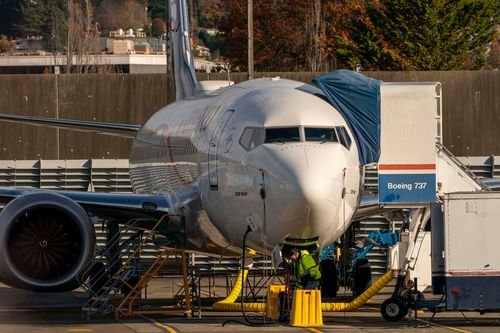Facing back-to-back crises, Boeing posts a record loss

Boeing closed the books on its worst year ever, posting record losses and plunging sales on the backs of combined crises: the Covid-19 pandemic and the problems getting the 737 Max back in the air.
The company’s loss from operations climbed to $12.8 billion, up from nearly $2 billion a year ago, which was Boeing’s previous record loss. The company’s net loss soared to $11.9 billion, also an increase from the previous year’s record of $636 million.
The net loss is so much larger partlybecause of the decision announced Wednesday to push the first delivery of its newest jet, the 777X, back to 2023, from its previous target of a 2022 launch. The widebody long-range plane was designed to be used mostly on international travel, and that is the part of air travel that is expected to take the longest time to recover from the pandemic. Boeing took at $6.5 billion charge as a result of that delay.
Shares of Boeing fell 3% in midday trading on the much larger than expected loss.
The company was hammered by a near halt in air travel caused by the pandemic, which caused airlines around the globe to cancel or postpone orders and scheduled deliveries of new planes. Revenue plunged 24% to $58.2 billion for the year.
CEO’s outlook
“2020 was a historically challenging year for our world, for our industry, for our business and our communities,” said CEO Dave Calhoun. And he warned that recovery in the airline sector is not imminent, saying “the next six to nine months will remain very challenging for our airline customers and the entire industry.”
He noted Covid-19 infection rates remain high in many areas and travel restrictions are still in place.
“We expect it will take around three years for travel to return to the 2019 levels and a few years beyond that to return to our long-term growth trends,” Calhoun said.
Currently, the number of planes in the air is down about 25% from pre-pandemic levels, he added. But The good news for aircraft makers is that about 1,400 planes that were parked have been permanently retired — so they will be replaced by new planes when demand returns, as airlines phase in newer, more fuel-efficient models.
But with international travel likely to stay depressed for at least the next couple of years, demand for widebody planes will be hurt. Boeing is the market leader in that sector. The soft international travel outlook is one of the reasons the company pushed the debut of its 777X to the end of 2023.
Boeing is also struggling to resume deliveries of the 787 Dreamliner at the end of the first quarter. The 787 is another widebody design what is suffering from recent production issues. Calhoun said Wednesday that Boeing will deliver few, if any, 787s in February.
Contrast that with 2018, when Boeing reported record earnings as well as record revenue that topped $100 billion for the first time. But in March 2019, its best-selling plane, the 737 Max, was grounded following two fatal crashes that killed 346 people. It took until November 2020 for the plane to win approval to fly passengers again, far longer than original estimates, and the company hemorrhaged money since then.
While the US Federal Aviation Administration approved the plane to fly in November, other regulators around the world, including China, have yet to clear it to carry passengers. European regulators approved the plane on Wednesday. Boeing has reported costs of more than $20 billion associated with the 737 Max crisis.
But the real blow to Boeing results came from the huge losses in the airline industry caused by the pandemic. It recorded a record 655 canceled orders for its planes during 2020, and only delivered 157 planes during the course of the year, down from 380 it had delivered in 2019, and 806 it had delivered in 2018 before the 737 Max crisis. And with the continued problems in the airline industry it will take sometime for Boeing to get deliveries and revenue back on track.
Analysts forecast that Boeing revenue will climb back to $78 billion in 2021, helped by the deliveries of about half of the more than 400 737 Max jets it built during the grounding but was unable to deliver. That could lift Boeing back into modest profitability by the middle of the year.
But the company will be a smaller company than it was before the crises.
It has announced it expects to reduce staff to 130,000 by the end of 2021, down from 161,000 on staff at the start of 2020. About 19,000 of those jobs had been eliminated in the first nine months of 2020 through a combination of buyouts and involuntary layoffs. It will end production of the 747 in 2022, and halt production of the 787 Dreamliner in Washington state in 2021 as it consolidates production at a plant in South Carolina.